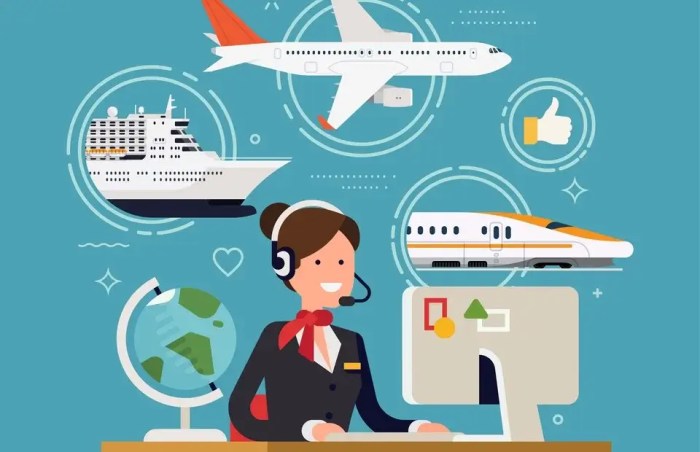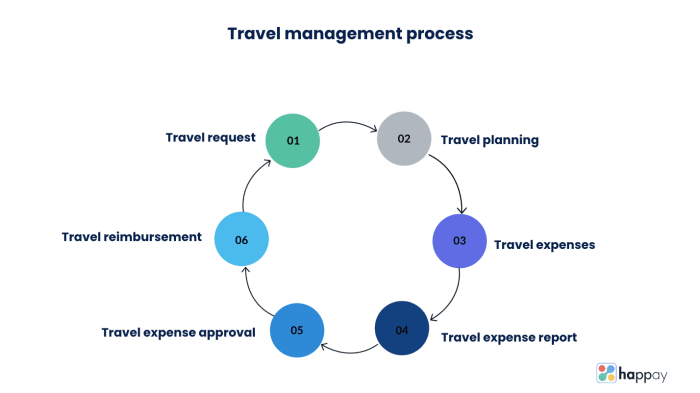Corporate Travel for Small Business A Practical Guide
It is a critical aspect of modern commerce, often demanding innovative solutions to navigate challenges and seize opportunities. This guide explores the nuances of small business travel, highlighting the unique considerations that differ from larger corporations.
From budget management and cost optimization strategies to leveraging technology and crafting effective travel policies, this comprehensive overview equips small businesses with practical tools and insights for seamless and efficient corporate travel.
Corporate Travel for Small Businesses

Source: businessclassexperts.com
Small businesses often face unique challenges when managing corporate travel, balancing cost-effectiveness with the need to connect with clients and partners. Successfully navigating these complexities can significantly impact a small business’s bottom line and overall operational efficiency. Effective travel planning can boost productivity, facilitate collaboration, and strengthen business relationships, while poorly managed travel can lead to wasted resources and missed opportunities.
Challenges and Opportunities
Small businesses often operate with tighter budgets and fewer resources compared to larger corporations. This translates to a greater emphasis on cost-saving measures and efficient travel planning. However, the need for face-to-face interactions remains crucial for building relationships and fostering business growth. Successfully navigating this balancing act presents a significant opportunity for small businesses to gain a competitive edge by optimizing travel expenses and maximizing return on investment.
Unique Needs and Priorities
Small business travel differs from that of larger corporations in several key aspects. Small businesses frequently prioritize the cost-effectiveness of travel arrangements, aiming to minimize expenses while maintaining the quality of service. Often, travel is more closely tied to specific business objectives, such as client meetings or product demonstrations. This targeted approach demands meticulous planning to ensure the travel aligns directly with business goals. Additionally, small businesses often rely on a smaller travel team, demanding greater efficiency and adaptability in travel processes.
Cost-Effectiveness and Efficiency
Cost-effectiveness and efficiency are paramount in small business travel planning. Careful consideration of transportation options, accommodation choices, and potential discounts is crucial. Utilizing online travel agencies (OTAs) and comparing prices across various platforms can help identify cost-effective solutions. Prioritizing direct flights, strategically selecting lodging options, and negotiating group rates for multiple employees are all key components of achieving cost savings. The goal is to maximize the value of every travel dollar spent, directly impacting the profitability of the small business.
Role of Technology in Streamlining Processes
Technology plays a pivotal role in streamlining small business travel processes. Travel management systems (TMS) offer centralized booking, expense tracking, and reporting capabilities, allowing for efficient management of travel itineraries and associated costs. Utilizing mobile apps for travel booking and expense reporting enhances efficiency, providing real-time updates and access to important travel information. Implementing robust travel policies and digital expense reporting tools can improve accountability and reduce the likelihood of errors, promoting greater control over travel costs.
Budget Management and Cost Optimization
Effective budget management is crucial for small businesses, and travel expenses often represent a significant portion of the overall budget. Implementing strategies for controlling travel budgets and optimizing costs can significantly impact profitability and resource allocation. By understanding and implementing these strategies, small businesses can ensure their travel investments are productive and contribute to their overall success.
Controlling travel budgets requires a proactive approach that considers various factors. Careful planning, diligent expense tracking, and negotiating favorable rates with travel providers are key components of this process. Implementing clear travel policies that prioritize cost-effectiveness can further contribute to responsible spending and maximize return on travel investment.
Strategies for Controlling Travel Budgets
Effective budget management necessitates a proactive approach to travel planning. This involves developing clear guidelines and policies that govern travel expenses, establishing a centralized system for tracking and reporting travel costs, and implementing measures to discourage unnecessary spending. This holistic approach ensures that travel investments align with business objectives and contribute positively to the bottom line.
Methods for Identifying and Eliminating Unnecessary Travel Expenses
Identifying and eliminating unnecessary travel expenses is crucial for cost optimization. This requires careful evaluation of travel needs, exploring alternative transportation options, and scrutinizing the necessity of certain trips. Analyzing historical travel data can reveal patterns and trends that highlight areas where expenses can be reduced without compromising business objectives.
Negotiating Better Rates with Travel Providers
Negotiating favorable rates with travel providers can significantly reduce travel costs. This involves proactively contacting travel agents or booking platforms to inquire about discounts, volume pricing, or group booking options. Building strong relationships with travel providers can yield better deals and potentially reduce long-term travel costs.
Travel Policies for Cost-Conscious Travel
Establishing clear travel policies that prioritize cost-consciousness is vital for maintaining control over travel budgets. These policies should Artikel acceptable travel methods, accommodation choices, and meal allowances. Encouraging employees to utilize cost-effective transportation options and book accommodations in advance can minimize expenses while maintaining operational efficiency. Examples include encouraging the use of public transport or carpooling where feasible, and setting reasonable daily allowances for meals.
Comparing Travel Booking Platforms Based on Cost-Effectiveness
| Travel Booking Platform | Cost-Effectiveness (Average Savings Potential) | Additional Features | Ease of Use |
|---|---|---|---|
| Platform A | 10-15% | Flexible booking options, loyalty programs, and diverse accommodation choices | Good |
| Platform B | 5-10% | Focus on business travel, streamlined booking process | Excellent |
| Platform C | 8-12% | Integration with expense reporting systems, dedicated customer support | Good |
This table provides a general comparison of three popular travel booking platforms. Factors like average savings potential, additional features, and ease of use are considered to provide a comprehensive overview. Specific results may vary depending on individual travel needs and booking patterns. It’s important to carefully evaluate these platforms based on the specific requirements of your small business.
Technology Tools for Small Business Travel

Streamlining the travel process for small businesses is crucial for efficiency and cost savings. Technology plays a pivotal role in achieving these goals. Modern travel management tools offer sophisticated features, simplifying booking, expense tracking, and overall travel administration. Implementing the right tools can significantly impact a company’s bottom line and free up valuable time for core business functions.
Popular Travel Management Tools
Several travel management tools cater specifically to the needs of small businesses. These platforms often offer a combination of booking capabilities, expense reporting, and policy management, customized to meet the unique requirements of smaller organizations. Choosing the right platform requires careful consideration of the features, cost, and ease of use.
Comparison of Features and Functionalities
Different tools provide varying levels of functionality. Some focus primarily on booking and expense tracking, while others offer more comprehensive solutions, including reporting and policy management. The key features often include automated booking, integrated expense reports, real-time tracking, and customizable policies. Tools with robust reporting capabilities allow for detailed analysis of travel spending and identification of potential cost savings.
Benefits of Using Technology Tools
Implementing travel management tools can streamline the entire travel process. Automated booking and expense tracking minimize manual effort, reducing the risk of errors and freeing up valuable time for business owners and employees. Centralized platforms offer a single source of truth for all travel-related information, making it easier to manage and track expenses. Real-time tracking enables proactive management of potential issues, such as delays or unexpected costs. This helps businesses maintain control over their travel budgets and ensures compliance with company policies.
Importance of Mobile Apps
Mobile apps are increasingly important for managing travel for small businesses. Their accessibility and real-time updates allow employees to manage their travel arrangements on the go. This is particularly beneficial for businesses with employees who frequently travel. The ability to book flights, hotels, and other travel arrangements, as well as submit expense reports, directly from mobile devices, enhances efficiency and responsiveness. Real-time information ensures that travel plans are updated immediately, facilitating better control and management.
Key Features of Travel Management Software, CorporateTravell for Small Businesses
| Feature | Solution A | Solution B | Solution C |
|---|---|---|---|
| Booking Engine | Intuitive interface, integrates with major travel providers | Direct booking integration with major airlines and hotels | Wide range of options, integrates with various travel agencies |
| Expense Reporting | Automated expense tracking, customizable expense categories | Simple expense entry and submission, real-time expense approval | Detailed expense reports, integrates with accounting software |
| Policy Management | Customizable travel policies, automated compliance checks | The policy management portal allows for easy updates | Extensive policy management system, user-friendly interface |
| Reporting and Analytics | Basic reporting, overview of travel spend | Detailed reporting identifies cost-saving opportunities | Advanced reporting, drill-down analysis of travel data |
| Mobile App | Available for iOS and Android | Available for iOS and Android, with real-time updates | Available for iOS and Android, integrates with company expense systems |
“Implementing the right travel management tools can significantly impact a company’s bottom line and free up valuable time for core business functions.”
Travel Planning and Booking Processes

Source: blackcarnews.com
Effective travel planning is crucial for small businesses, ensuring smooth operations and optimal cost management. A well-defined process streamlines the booking process, reduces potential errors, and allows for better control over travel budgets. This is especially important for small businesses, where every dollar counts and efficient resource allocation is key.
A structured approach to travel planning and booking integrates seamlessly with the overall workflow of a small business. This integration minimizes administrative burden, fosters better communication, and enables timely adjustments to travel plans, crucial for maintaining business continuity.
Step-by-Step Process for Planning and Booking Business Trips
A clear, step-by-step process is essential for managing travel arrangements efficiently. This process ensures that all necessary information is gathered and that the booking aligns with company policies and budget constraints.
- Identify Trip Requirements: Define the purpose of the trip, including dates, destinations, and required personnel. Consider any specific needs, such as visa requirements or special accommodations.
- Establish Budgetary Guidelines: Article a clear budget for the trip, including flights, accommodation, meals, and other expenses. This will help in the selection of appropriate options and prevent overspending.
- Research and Compare Travel Options: Utilize online travel agencies or specialized corporate travel platforms to compare flight options, hotel accommodations, and other relevant services. Consider factors such as price, convenience, and customer reviews.
- Finalize Booking and Confirmation: Once suitable options are selected, finalize the booking through the chosen platform. Ensure the details are accurate and confirm the booking with the relevant providers.
- Communicate with Employees: Distribute details of the booking, including flight information, hotel details, and any other relevant instructions, to employees involved in the trip. This ensures everyone is prepared for the travel arrangements.
Integrating Travel Planning into Business Workflow
Integrating travel planning into the overall business workflow streamlines operations and enhances efficiency. This integration also provides better visibility into travel costs and facilitates budget tracking.
- Establish Clear Communication Channels: Designate a point of contact for travel arrangements within the company to ensure all travel requests are managed effectively. Use shared calendars and communication platforms for timely updates and coordination.
- Utilize Project Management Tools: Integrate travel planning into existing project management software, enabling seamless task management and progress tracking. This ensures that travel arrangements are planned in conjunction with other project activities.
- Implement Travel Policy Compliance: Ensure all travel arrangements adhere to the company’s established travel policy. This will help to maintain consistency in travel procedures and avoid potential issues.
- Monitor and Analyze Travel Expenses: Regularly track and analyze travel expenses to identify areas for cost optimization. This data will be invaluable in future travel planning.
Flow Chart of Travel Planning Stages
A visual representation of the travel planning process facilitates understanding and ensures consistency.
| Stage | Description |
|---|---|
| Trip Request | Initiate the travel request, specifying details such as destination, dates, and purpose. |
| Budget Approval | Obtain budgetary approval for the trip based on the estimated cost. |
| Booking Research | Identify and compare travel options, considering factors like price, convenience, and customer reviews. |
| Booking Confirmation | Finalize the booking and confirm details with relevant providers. |
| Employee Notification | Communicate travel arrangements to the employees involved. |
Importance of Secure Travel Booking Platforms
Secure travel booking platforms are essential for safeguarding sensitive data and maintaining compliance with data protection regulations.
Implementing secure travel booking platforms is vital to protecting sensitive data, complying with data protection regulations, and reducing the risk of fraud.
Small businesses should prioritize secure platforms to maintain the confidentiality and integrity of travel arrangements.
Importance of Communication and Collaboration
Effective communication and collaboration between employees and travel agents are paramount for successful travel arrangements.
Clear communication channels ensure that all parties are informed and aligned on the details of the trip. This approach minimizes errors and facilitates efficient travel management.
Employee Travel Policies and Guidelines
A well-defined travel policy is crucial for small businesses to manage expenses effectively, mitigate risks, and maintain a professional image. Clear guidelines ensure employees understand expectations and procedures, fostering compliance and reducing potential liabilities. This document articulates the importance of a comprehensive policy and details its key components.
Importance of a Well-Defined Travel Policy
A robust travel policy is essential for small businesses, regardless of size. It establishes clear expectations for employee travel, protecting the company from unnecessary costs and potential legal issues. It also fosters a culture of accountability and transparency. Consistent application of the policy helps ensure fair and equitable treatment of all employees. By addressing potential risks and outlining procedures for reimbursement and expense reporting, the policy provides a framework for smooth and compliant travel operations.
Elements of a Comprehensive Travel Policy
A comprehensive travel policy should cover various aspects of employee travel. It needs to include detailed guidelines for booking travel, expense reporting, and reimbursement procedures. This includes the authorized travel methods, appropriate lodging options, and guidelines for meal expenses. Additionally, it must clearly state the company’s position on safety and security during travel.
Examples of Travel Policies Addressing Potential Risks and Liabilities
Travel policies should address potential risks and liabilities, such as safety concerns, insurance requirements, and legal considerations. For example, a policy might specify that employees must inform their supervisor of their travel plans and obtain necessary approvals. It should also detail how employees must comply with local laws and regulations during their trips. Furthermore, the policy should articulate the required travel insurance coverage and procedures for reporting any incidents or emergencies.
Best Practices for Managing Employee Expenses Related to Travel
Effective expense management is a critical aspect of any travel policy. Best practices include using company-approved travel booking platforms and expense reporting software. This facilitates efficient tracking and reconciliation of travel expenses. These platforms typically offer detailed expense reporting templates, streamlining the process for both employees and the finance department. This efficiency can help prevent discrepancies and delays in reimbursement.
Key Components of a Small Business Travel Policy
| Component | Description |
|---|---|
| Travel Authorization | Requires pre-approval for all business trips, outlining the purpose, destination, and duration. |
| Booking Procedures | Specifies the preferred booking methods (e.g., company-approved travel agencies, online platforms). |
| Expense Reporting | Article the necessary documentation (e.g., receipts, itineraries) and the process for submitting expense reports. |
| Reimbursement Policies | Details the reimbursement process, including timelines, acceptable expenses, and any deductions. |
| Safety and Security | Provides guidelines for employee safety during travel, including emergency contacts and reporting procedures. |
| Travel Insurance | Requires employees to obtain appropriate travel insurance and adhere to the coverage provided by the company. |
| Compliance with Regulations | Emphasizes adherence to local laws and regulations in the destinations. |
| Confidentiality | Highlights the importance of maintaining the confidentiality of sensitive information during travel. |
Travel Insurance and Risk Management
Protecting your small business’s investment in travel requires a robust approach to risk management. Travel insurance is a critical component of this strategy, providing financial safeguards against unforeseen events that could derail a trip or cause significant financial hardship. Properly chosen and understood policies can mitigate potential losses and ensure smooth operations, even during unexpected challenges.
The Necessity of Travel Insurance
Travel insurance is not merely a luxury; it’s a crucial necessity for small businesses. Unforeseen circumstances like medical emergencies, trip cancellations due to weather or unforeseen events, lost luggage, or even delays can lead to significant financial and operational disruptions. Without insurance, these events can leave a company exposed to substantial out-of-pocket expenses and potential damage to its reputation, impacting both immediate travel plans and future business ventures.
Different Types of Travel Insurance Policies
Various travel insurance policies cater to different needs and budgets. Understanding the distinctions between these policies is vital for making an informed choice. Comprehensive plans often include coverage for medical expenses, trip cancellations, baggage loss, and even personal liability. Other policies might focus on specific aspects, such as medical coverage alone or trip interruption. Policies can be tailored to cover individual employees or the entire team, with options for adding specific coverage for certain risks.
Protecting the Business Against Travel-Related Risks
Travel-related risks can negatively impact a small business in several ways. Unexpected delays can lead to missed deadlines or client meetings. Medical emergencies can result in substantial medical bills and potentially lost productivity. Theft or damage to equipment can cause delays or the need for expensive replacements. Travel insurance safeguards the business against these risks by covering expenses related to these incidents. It also protects the business’s reputation and ensures the smooth execution of travel plans.
Procedures for Handling Unforeseen Travel Disruptions
Having clear procedures in place for handling unforeseen travel disruptions is critical. This involves establishing a communication protocol with employees who are traveling, outlining the steps to be taken in case of emergencies, and identifying backup plans for essential tasks. These procedures ensure a swift and organized response to challenges, minimizing the impact on business operations.
Key Factors to Consider When Selecting Travel Insurance
Selecting the right travel insurance policy requires careful consideration of several key factors. Firstly, assess the specific needs of your employees and the type of travel they will undertake. Secondly, compare coverage amounts and exclusions carefully. Consider factors like pre-existing medical conditions, specific activities, and potential risks associated with the destination. Finally, review the claims process and customer service reputation of the insurance provider. Evaluating these elements will help you choose a policy that effectively protects your business and employees against travel-related risks.
Environmental Considerations in Small Business Travel
Corporate travel, while essential for many small businesses, carries a significant environmental footprint. Understanding and mitigating this impact is crucial for sustainability and responsible business practices. This section explores the environmental impact of corporate travel, sustainable practices, eco-friendly options, and the importance of reducing carbon emissions.
The modern business landscape demands efficient and cost-effective travel solutions, often at the expense of environmental responsibility. By proactively implementing sustainable travel strategies, small businesses can minimize their carbon footprint, contribute to a healthier planet, and enhance their brand image as environmentally conscious entities.
Environmental Impact of Corporate Travel
Corporate travel contributes substantially to greenhouse gas emissions, primarily from air travel. The emissions from vehicles used for travel, accommodation, and even food consumption during trips further amplify the overall impact. These emissions contribute to climate change, impacting global ecosystems and human health.
Sustainable Travel Practices for Small Businesses
Adopting sustainable travel practices is crucial for minimizing the environmental footprint of small business trips. These practices involve a conscious effort to reduce carbon emissions throughout the travel lifecycle. This includes prioritizing the use of public transportation, carpooling, or electric vehicles whenever feasible. Choosing accommodations with eco-friendly practices and reducing the consumption of single-use plastics, and minimizing waste are further steps.
Eco-Friendly Travel Options for Small Businesses
Several eco-friendly travel options are available for small businesses. Prioritizing train travel over air travel whenever possible reduces carbon emissions significantly. Utilizing electric or hybrid vehicles for ground transportation and selecting hotels with sustainability certifications are crucial steps.
Importance of Reducing Carbon Footprint in Corporate Travel
Reducing the carbon footprint in corporate travel is not just a trend; it’s a necessity. Minimizing emissions directly combats climate change and its detrimental effects. Furthermore, it demonstrates a company’s commitment to environmental responsibility, attracting environmentally conscious customers and employees. It is a powerful tool for building a positive brand image.
Eco-Friendly Transportation Options and Costs
| Transportation Option | Estimated Cost (USD per person, one-way) | Environmental Impact (Low/Medium/High) |
|---|---|---|
| Train | $50 – $200 | Low |
| Electric Vehicle (EV) | $20 – $50 (depending on distance) | Low |
| Public Transportation (Bus/Subway) | $5 – $20 | Low |
| Domestic Flights | $100 – $500+ | High |
| International Flights | $500+ | High |
Note: Costs are estimates and can vary based on distance, route, and time of year.
Collaboration and Partnerships in Travel

Strategic partnerships between small businesses and travel providers can significantly reduce travel costs and improve the overall travel experience. By leveraging the expertise and resources of others, small businesses can optimize their travel programs and focus on core competencies. This approach allows for more efficient management of travel budgets and potentially better deals.
Examples of Successful Partnerships
Many small businesses find cost-effective solutions through collaborations with travel management companies (TMCs). For instance, a small software company might partner with a TMC specializing in corporate travel to streamline booking procedures and secure group discounts. Similarly, a local artisan business could partner with a travel agency specializing in cultural tourism to arrange tours and provide unique experiences for clients. These types of collaborations often result in personalized itineraries and reduced administrative burdens.
Potential Collaborators and Partners
Potential partners for small business travel include travel management companies (TMCs), online travel agencies (OTAs), local travel agents, and even other businesses in similar industries. TMCs offer extensive experience in negotiating corporate travel rates and managing large volumes of bookings. OTAs can provide competitive pricing for flights and accommodations. Local travel agents can offer tailored itineraries and insights into specific destinations. Collaboration with other businesses in similar industries can lead to shared travel programs, potentially reducing costs and providing access to exclusive deals.
Benefits of Forming Partnerships
Forming strategic partnerships brings numerous advantages. Firstly, partnerships can lead to better travel deals. TMCs, for example, often negotiate bulk discounts with airlines and hotels, which small businesses, operating independently, would be unlikely to secure. Secondly, partnerships streamline the travel booking process. This efficiency saves time and resources for small business owners, allowing them to focus on core business operations. Thirdly, partnerships often provide specialized expertise in travel planning, which can be invaluable for complex itineraries or unique travel needs.
Building Strong Relationships with Travel Agents
Building strong relationships with travel agents is crucial. Effective communication, trust, and mutual understanding are essential components of these partnerships. Travel agents can provide valuable insights into travel trends, emerging destinations, and cost-effective solutions. Open communication channels and clear expectations regarding travel needs can foster long-term, mutually beneficial relationships. Small businesses should look for agents with a proven track record and a strong understanding of their specific travel needs.
Resources for Finding Travel Partners
Several resources are available to help small businesses find suitable travel partners. Online directories of travel management companies and travel agents can provide a starting point for research. Industry associations and networking events can introduce small businesses to potential partners. Recommendations from other small businesses or trusted advisors can also be valuable resources in the search for suitable travel partners.
- Online travel agent directories
- Industry associations and conferences
- Business networking groups
- Recommendations from other small business owners
Epilogue: Corporate Travel
In conclusion, navigating corporate travel for small businesses requires a blend of strategic planning, technological proficiency, and proactive risk management. By implementing the strategies and tools discussed, small businesses can optimize their travel processes, control costs, and ensure a smooth and successful experience for their employees. This ultimately contributes to improved efficiency, strengthened employee morale, and enhanced business outcomes.





